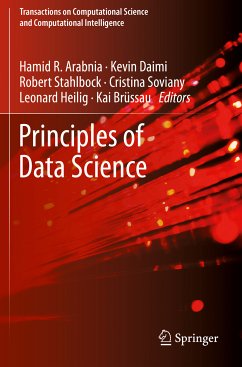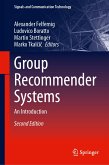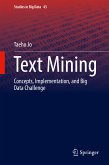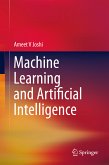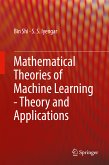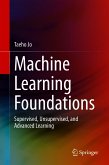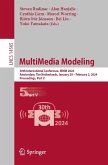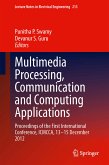This book provides readers with a thorough understanding of various research areas within the field of data science. The book introduces readers to various techniques for data acquisition, extraction, and cleaning, data summarizing and modeling, data analysis and communication techniques, data science tools, deep learning, and various data science applications. Researchers can extract and conclude various future ideas and topics that could result in potential publications or thesis. Furthermore, this book contributes to Data Scientists' preparation and to enhancing their knowledge of the field. The book provides a rich collection of manuscripts in highly regarded data science topics, edited by professors with long experience in the field of data science.
- Introduces various techniques, methods, and algorithms adopted by Data Science experts
- Provides a detailed explanation of data science perceptions, reinforced by practical examples
- Presents a roadmap of future trends suitable for innovative data science research and practice
Dieser Download kann aus rechtlichen Gründen nur mit Rechnungsadresse in A, B, BG, CY, CZ, D, DK, EW, E, FIN, F, GR, HR, H, IRL, I, LT, L, LR, M, NL, PL, P, R, S, SLO, SK ausgeliefert werden.
Die Herstellerinformationen sind derzeit nicht verfügbar.
Hamid R. Arabnia received a Ph.D. degree in Computer Science from the University of Kent (England) in 1987. He is currently a Professor (Emeritus) of Computer Science at University of Georgia (Georgia, USA), where he has been since October 1987. His research interests include parallel and distributed processing techniques and algorithms, supercomputing, Data Science (in the context of scalable HPC), imaging science, and other compute intensive problems. His most recent activities include: Studying ways to promote legislation that would prevent cyber-stalking, cyber-harassment, and cyber-bullying. As a victim of cyber-harassment and cyber-bullying, in 2017 and 2018 he won a lawsuit with damages awarded for a total of $3 Million (includes $650K awarded for attorney's costs). Since this court case was one of the few cases of its kind in the United States, this ruling is considered to be important. Prof. Arabnia is Editor-in-Chief of The Journal of Supercomputing (Springer). He is the book series editor-in-chief of "Transactions of Computational Science and Computational Intelligence" (Springer). He is the editor of Computational Science and Computational Intelligence (IEEE CPS). He is a Senior Adviser to a number of corporations and is a Fellow and Adviser of Center of Excellence in Terrorism, Resilience, Intelligence & Organized Crime Research (CENTRIC). Dr. Kevin Daimi received his Ph.D. from the University of Cranfield, England. He has a long mixture of academia and industry experience. He has worked as Senior Programmer/Systems Analyst, Computer Specialist, and Computer Consultant. He is currently Professor of Computer Science and Software Engineering Programs at the University of Detroit Mercy. His research interests include Data Science, Computer and Network Security with emphasis on vehicle network security, Software Engineering, and Computer Science and Software Engineering Education. Two of his publications received the BestPaper Award from two international conferences. He has been a member of the International Conference on Data Mining (DMIN) since 2004, and a member of the Program Committee for the 2018 International Conference on Data Science (ICDATA'18). He participated in a number of Data Science workshops. Kevin is a Senior Member of the Association for Computing Machinery (ACM), a Senior Member of the Institute of Electrical and Electronic Engineers (IEEE), and a Fellow of the British Computer Society (BCS). He served as a Program Committee member for many international conferences and chaired some of them. In 2103, he received the Faculty Excellence Award from the University of Detroit Mercy. Robert Stahlbock is a lecturer and researcher at the Institute of Information Systems, University of Hamburg. He is also lecturer at the FOM University of Applied Sciences since 2003. He holds a diploma in Business Administration and a PhD from the UHH. His research interests are focused on managerial decision support and issues related to Maritime Logistics and other industries as well as Operations Research, Information Systems, Business Intelligence and Data Science. He is author of research studies published in international prestigious journals, conference proceedings and book chapters. He serves as guest editor of data science related books, as reviewer for international leading journals as well as a member of conference program committees. He is General Chair of the annual International Conference on Data Science since 2006. He also consults companies in various sectors and projects. Kai Brüssau is a lecturer and researcher at the Institute of Information Systems, University of Hamburg. He holds a diploma in Business Mathematics and a PhD from the UHH. In his research as well as in his courses he cooperates with Bachelor and Master students in several projects belonging to the fields of Operations Research, Data Science, and Business Analytics. Therefore, the application of optimization and Data Mining methods for solving practical problems is his main interest. In many industry projects he works together with several companies, e.g. a telecommunication provider, port logistics enterprises, and manufacturers. He also focuses on developing new approaches and implementing them in different application systems. Leonard Heilig is a lecturer and researcher at the Institute of Information Systems, University of Hamburg. He holds a M.Sc. in Information Systems and a PhD from the UHH. His current research interest is centered around Cloud Computing, Operations Research, and Data Science with applications in Logistics and Telecommunications. He spent some time at the University of St Andrews (Scotland, UK) and at the Cloud Computing and Distributed Systems (CLOUDS) Lab at the University of Melbourne, Australia. He served as guest editor for several international journals and consults companies in various sectors and projects. Dr. Cristina Soviany holds a MSc degree in Computer Science from Polytechnics University of Bucharest, Romania, and a PhD in Applied Sciences from Delft University of Technology, the Netherlands. She is a technologist with strong academic, R&D and more than 14 years of entrepreneurial experience. She has published in many scientific magazines and presented in several international conferences like Money 2020, MRC, MPE, RegTech Summit NY, B-Hive conf., Vendorcom events. Dr. Soviany is currently the co-founder and CEO of Features Analytics, a young AI technology company based in Belgium. She has been awarded the prize for leading the most innovative technology company in Europe in December 2011 and benefits from continuous financial support of Belgian Ministry of Economy and Scientific Research. Prior to starting Features Analytics, Cristina has worked as a senior scientist for Philips Applied Technologies, Netherlands. She then joined the Advanced Medical Diagnostics(AMD), a start-up company based in Belgium, for six years. At AMD, Cristina was in charge of leading the development of an innovative technology for cancer tissue characterization in 3D ultrasound data.
Introduction.- Data Acquisition, Extraction, and Cleaning.- Data Summarization and Modeling.- Data Analysis and Communication Techniques.- Data Science Tools.- Deep Learning in Data Science.- Data Science Applications.- Conclusion.

